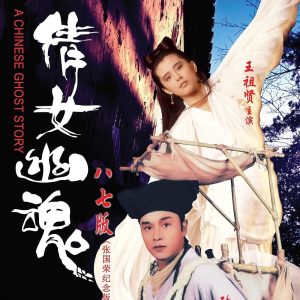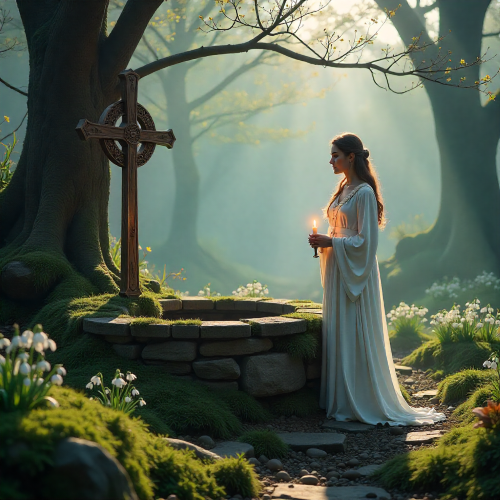Sien Nui Yau Wan (1987)
| Description | |
|---|---|
| Country of Origin | Hong Kong |
| Language | Cantonese |
| Genre | Romance |
| Cast | Leslie Cheung, Joey Wong, Wu Ma |
| Directed by | Ching Siu-tung |

Released in 1987, Sien Nui Yau Wan, internationally known as A Chinese Ghost Story, remains a timeless gem of Hong Kong cinema. Directed by Ching Siu-Tung and produced by Tsui Hark, the film transcends genres, blending romance, horror, and myth in a uniquely poetic way. At its heart, Sien Nui Yau Wan is not just a love story between a human scholar and a ghostly maiden—it is a mythological fable rooted in centuries of Chinese folklore, Daoist spirituality, and the eternal tension between the mortal and the supernatural worlds.
The story follows Ning Caichen, a kind but naive scholar who unknowingly falls in love with Nie Xiaoqian, a beautiful ghost bound to serve a demonic tree spirit. Their love defies the boundaries of life and death, echoing the mythological theme of reincarnation and the quest for spiritual liberation. This central romance is not merely tragic melodrama—it draws deeply from Pu Songling’s Strange Tales from a Chinese Studio (Liaozhai Zhiyi), a classic Qing dynasty collection of supernatural stories where spirits often embody human emotion and moral struggle. In Sien Nui Yau Wan, this mythic tone is palpable; the spirit world is not evil by default, but a reflection of human desires, regrets, and karmic consequences.
What makes Sien Nui Yau Wan particularly significant in the realm of mythology-based cinema is its authentic portrayal of Daoist mysticism. The character of Yin Chek Ha, the eccentric Taoist priest, serves as both comic relief and spiritual guide. Through him, the film explores rituals, talismans, chants, and cosmic dualities—concepts central to Chinese esoteric traditions. His mastery over the elements, exorcisms, and his ability to traverse realms emphasize the Daoist belief in harmony between yin and yang, life and afterlife. The depiction of spiritual warfare between the priest and the tree demon isn’t just action spectacle—it visualizes the ancient idea of balance and purification, a cosmic struggle between chaos and order that echoes through Chinese mythology.
The supernatural beings in Sien Nui Yau Wan reflect a pantheon-like structure familiar to Eastern mythology. The Tree Demon, for instance, is more than just a villain—it represents an ancient, corrupted nature spirit, a motif reminiscent of animistic traditions across Asia. Bound to its forest domain, it feeds on human souls, a metaphor for decay and moral corruption. In contrast, Nie Xiaoqian’s ghost embodies purity trapped within sin, highlighting the Buddhist and Daoist notion of samsara—the cycle of rebirth bound by attachment. The film’s narrative arc, where her spirit ultimately finds release through love and spiritual intervention, resonates with the mythological theme of redemption through compassion.
From a visual and symbolic standpoint, Sien Nui Yau Wan is drenched in mythic imagery. Mist-shrouded temples, moonlit graveyards, and shadowy forests evoke the liminal spaces where worlds overlap—the earthly and ethereal coexisting in fragile harmony. The use of blue and silver tones heightens the spectral quality of Xiaoqian’s presence, while the dynamic swordplay and ethereal light effects bring to life the energy flow known in Daoist alchemy as qi. These visual choices transform mythic concepts into cinematic language, creating a film that feels both fantastical and spiritually grounded.
Music also plays a crucial role in evoking the mythological aura of Sien Nui Yau Wan. Leslie Cheung’s performance as Ning Caichen is gentle and sincere, while Joey Wong’s haunting portrayal of Nie Xiaoqian captures the delicate sorrow of a spirit bound to fate. The theme song, composed by James Wong, feels almost like a lament from another world, carrying the emotional weight of forbidden love and the inevitability of destiny. Together, the music and performances bridge the emotional and metaphysical—one of the hallmarks of mythological storytelling.
Beyond its cinematic brilliance, Sien Nui Yau Wan revitalized the Chinese ghost story tradition for modern audiences. It reintroduced folklore to a new generation, reminding viewers that mythology was not confined to ancient texts—it could live vividly on screen, in motion, sound, and emotion. Its influence spread across East Asian cinema, inspiring sequels, television adaptations, and reinterpretations that continued to explore the boundaries between life, death, and devotion. In many ways, Sien Nui Yau Wan can be seen as a cinematic ritual—a reawakening of ancestral tales through modern artistry.
The film also mirrors a deeper cultural dialogue within Chinese mythology: the interplay of love and duty, desire and enlightenment. The human yearning for connection, even across the veil of death, reflects the Confucian and Buddhist values of loyalty, compassion, and the search for transcendence. Ning’s love for Xiaoqian, untainted by fear or prejudice, becomes a spiritual act, dissolving the illusion of separation between the living and the dead. This mythological underpinning gives the film its timeless quality—it’s not merely about ghosts, but about the soul’s longing to return to balance.
In essence, Sien Nui Yau Wan stands as one of the most visually poetic and mythologically rich films ever produced in Hong Kong cinema. It successfully fuses ancient folklore with 1980s cinematic innovation, resulting in a narrative that feels both otherworldly and emotionally grounded. For myth enthusiasts, it offers a gateway into the spiritual imagination of Chinese culture; for film lovers, it remains a masterpiece of fantasy storytelling where love transcends realms.
Even decades later, Sien Nui Yau Wan endures as a work of mythic cinema that captures the essence of what mythology seeks to express—the eternal struggle between attachment and release, between illusion and enlightenment, between mortality and the divine. It is more than just a ghost story; it is a myth reborn on screen, one that continues to haunt and enchant, reminding us that love, in all its forms, is the most powerful spirit of all.



